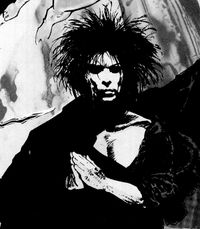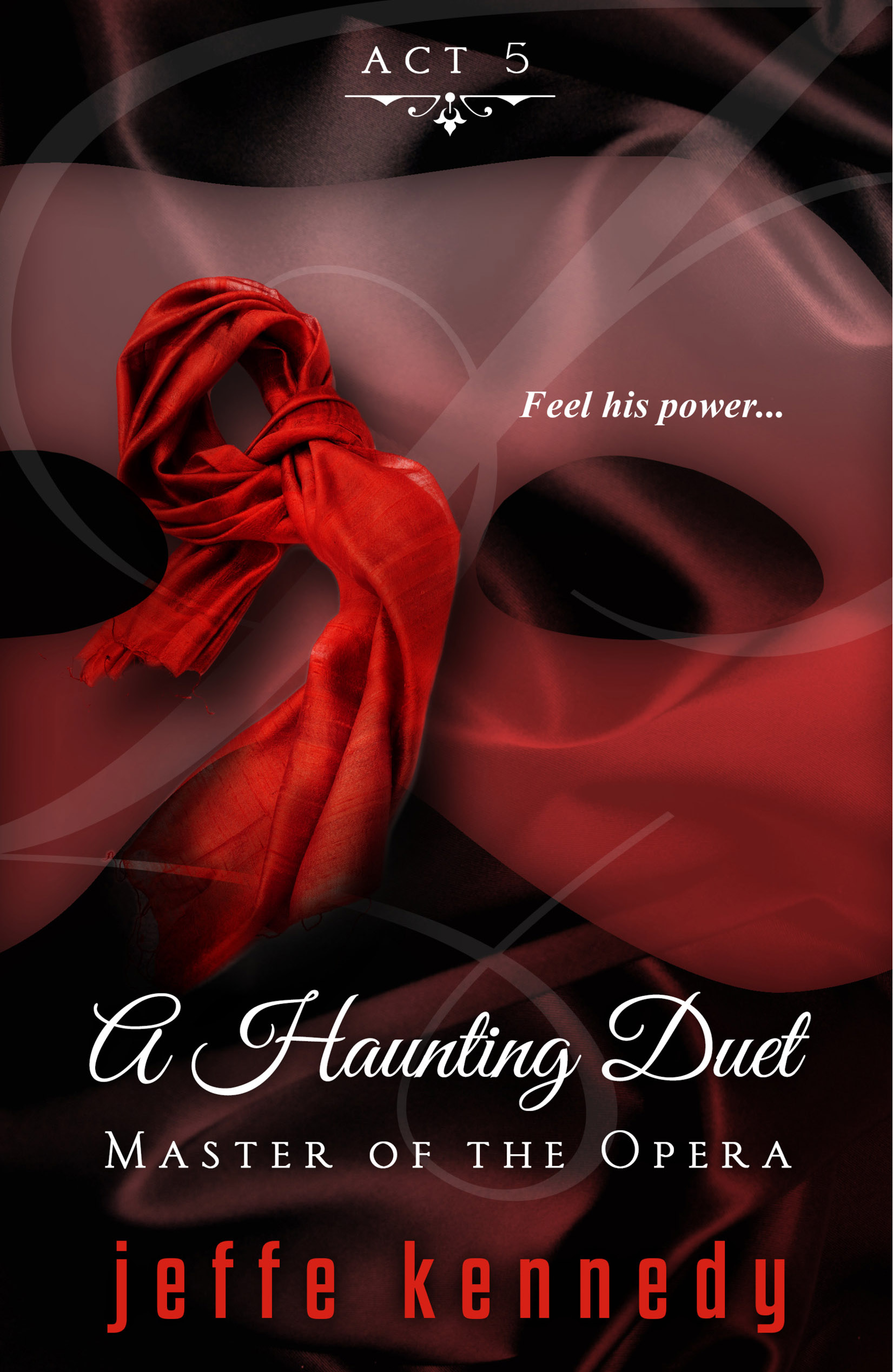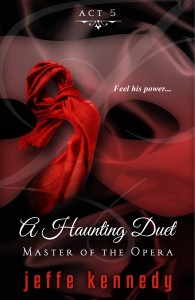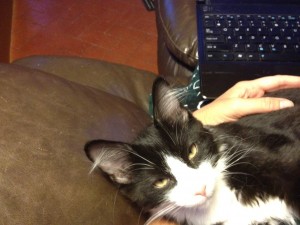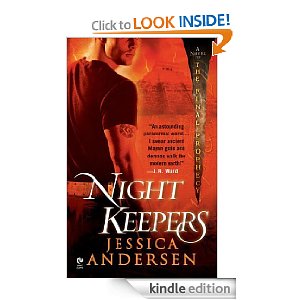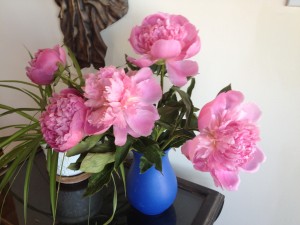 It’s funny living in Santa Fe, because it’s such a center for the visual arts. Ever since Georgia O’Keeffe arrived for a visit and fell in love with the light, visual artists of every stamp have flocked to the region. Galleries are everywhere and nearly every person you meet is a painter or a sculptor or a photographer or a jewelry maker and so on. It’s prevalent enough that it became a kind of running gag after we moved here, when we met new people – what kind of artist they’d be and how long before they told us we should buy some of their art.
It’s funny living in Santa Fe, because it’s such a center for the visual arts. Ever since Georgia O’Keeffe arrived for a visit and fell in love with the light, visual artists of every stamp have flocked to the region. Galleries are everywhere and nearly every person you meet is a painter or a sculptor or a photographer or a jewelry maker and so on. It’s prevalent enough that it became a kind of running gag after we moved here, when we met new people – what kind of artist they’d be and how long before they told us we should buy some of their art.
(I am deliberately specifying the visual arts because there’s a weird dearth of writers here. One of my writer friends calls it “the vast Siberia of literary arts” and she’s not far off.)
So, it’s not unusual to see people’s artistic efforts around the neighborhood – in a way you would never see in another community. It’s quite wonderful, really, even if some of the art is kind of bizarre. There’s one house down the block from us where the resident artist – I’m convinced it’s a woman, but I don’t know – is into painting the desert plants and artifacts. First she painted a cow skull in big blocks of lurid tempura colors – pink, green and yellow. Then a piece of driftwood. Then a wooden saguaro cactus. She seems to be into the quadrants of unnatural colors thing.
It’s not pretty.
Then I noticed the other day that she’d attacked a large, many branched cholla on their property and the poor thing is now painted in similar chunks of this bright color, which I’m pretty sure will kill its ability to photosynthesize. It’s like she’s Goldfinger, serially murdering the landscape.
At any rate, I can see what she’s going for – a very clear style – even if it doesn’t do much for me. I do wonder, however, if she’s sacrificing a heartfelt artistic effort for the sake of this style. This brand.
We writers hear about brand all the time these days. We’re in a peculiar position in that we, ourselves, are our brand. Just as we glommed onto authors, reading everything from an author on the library shelf, readers follow US, not necessarily our publishers or our genres. What we write arises out of us, but we are the physical embodiment of it because, even with print books, story remains intangible. It can be kind of a funky thing – especially when being sane about the business requires separating ourselves from our work.
I’m very careful to say “this work was rejected” or “this book got a good review,” not “I was rejected” or “I got a good review.”
But, for the purposes of branding, well meaning and helpful marketing types are forever reminding me that *I* am my brand. My brand is me. I’m pretty much just a walking, talking advertisement for All Things Jeffe. I’m picturing something like that old movie poster for the Attack of the 50 Foot Woman.
See how creepy this gets?
It struck me the other day, because I saw a youngish writer tweeting about writing tips. She said something along the lines of that, when she gets stuck writing, she thinks of her brand and what her readers would expect from her. I can see how this is smart marketing, but it bothered me. It took me a few days to pin down why.
This is the tail wagging the dog, right?
I mean, let’s look at someone like Neil Gaiman. He started out writing dark graphic novels and creepy stories. He liked wearing black t-shirts because they generally looked clean and matched everything. Over time, the way he looks and the stories he writes merged into a very recognizable “feel” that is quintessentially Neil Gaiman. This is partly because he’s a person who is comfortable with himself and his career. His sincerity and honesty, his self-deprecating humor and insightful intelligence – all of these combine to make him very recognizably himself.
But WHAT he writes is all over the place! He does exactly what the marketers advise us not to do. He writes children’s books, adult magical realism, horror, screenplays, graphic novels, science fiction and more. All under the same name, too.
Here’s how he answered a recent set of questions on his Tumblr:
1. How would you describe the genre of your work?
Stories.
2. Have you always known what genre you wanted to write, or was it a process?
I don’t know. I write stories, if that’s any help.
3. How important is the development of atmosphere and setting to the genre of your works?
Very, I think. Whatever genre they are, if they had no atmosphere or setting they would not be as good.
4. What do you prefer to write and why? (short stories, novels, screenwriting)
Yes. And the rest.
5. Is there any advice you would give to young aspiring writers? Thank you!
Write. Finish things. Worry less about genre and more about telling good stories.
Answers like this are why I admire him so much.
When he writes and hits a snag, do you think Neil asks himself what his brand is and what his readers would expect?
No no no.
Neil doesn’t think about what his brand is – or his genre, for that matter – because his allegiance is to the story. I feel very strongly that if we as writers don’t have first allegiance to the story, then we may become nothing more than factory workers, packaging little chunks of canned brand in the hopes of filling the supermarket shelves.
I don’t think we should EVER be thinking about brand while we’re writing. Writers often talk about the art of writing and the business of writing being two very different things. For me, I want to keep them that way. It’s a reality of the modern marketplace that writers must engage in the business end of writing far more than in the past. Nobody gets to be JD Salinger anymore, playing the hermit and refusing all interaction.
But we also don’t have to become what the marketers would make us into. There’s a soullessness to that and there are plenty of ways out there to make a living that are soulless and are much easier and more lucrative.
Like marketing. 😀
Seriously, if I wanted to be in sales and marketing, I would have gone to business school. I’m glad there are people who did and who then give us advice on how to get our books out there and into the hands of readers who will love them. But that’s a different way of seeing the world. I don’t tell them how supply and demand works and they don’t tell me how to craft a story.
That’s where I want my first loyalty to always be.
Story first. Sales later.
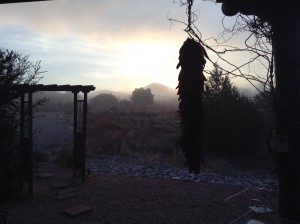 A piece of writing advice I often see tossed out there is that you must love your own characters, if you want your readers to love them. A parallel bit of advice is that a writer must be interested in the scene she writes in order to create interest in the reader. Every time I see this sort of thing, I pause and ask myself if I think that’s true.
A piece of writing advice I often see tossed out there is that you must love your own characters, if you want your readers to love them. A parallel bit of advice is that a writer must be interested in the scene she writes in order to create interest in the reader. Every time I see this sort of thing, I pause and ask myself if I think that’s true.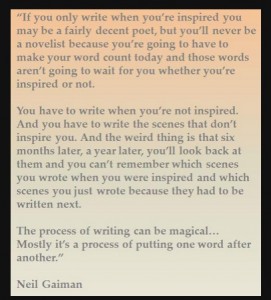 I’m not sure why it doesn’t work this way, but from my own experience, and from what other writers have said, it simply doesn’t. Neil Gaiman has written about this before and I can’t find the direct quote right now (updating to say I ran across it – posted in pic), but particularly for novel writing, there are long slogs where the writer might be bored out of his mind. Neil suggests that a writer who wants to feel constantly engaged by her own work might make a good poet, because poems are short enough. A novelist, however, he points out, has to have more endurance. It takes a long time to write a novel. I’ve calculated that I can write steadily at an average of 1,700 words per day, including days off and intervening edit rounds on other works. This means it takes me approximately 70 days to write a 120K word novel. That’s pretty fast, I’m reliably informed. It also works out to about 3 months writing the story.
I’m not sure why it doesn’t work this way, but from my own experience, and from what other writers have said, it simply doesn’t. Neil Gaiman has written about this before and I can’t find the direct quote right now (updating to say I ran across it – posted in pic), but particularly for novel writing, there are long slogs where the writer might be bored out of his mind. Neil suggests that a writer who wants to feel constantly engaged by her own work might make a good poet, because poems are short enough. A novelist, however, he points out, has to have more endurance. It takes a long time to write a novel. I’ve calculated that I can write steadily at an average of 1,700 words per day, including days off and intervening edit rounds on other works. This means it takes me approximately 70 days to write a 120K word novel. That’s pretty fast, I’m reliably informed. It also works out to about 3 months writing the story.